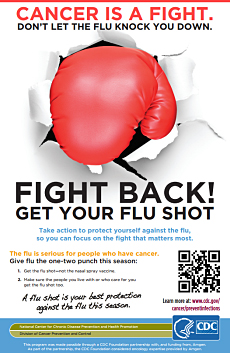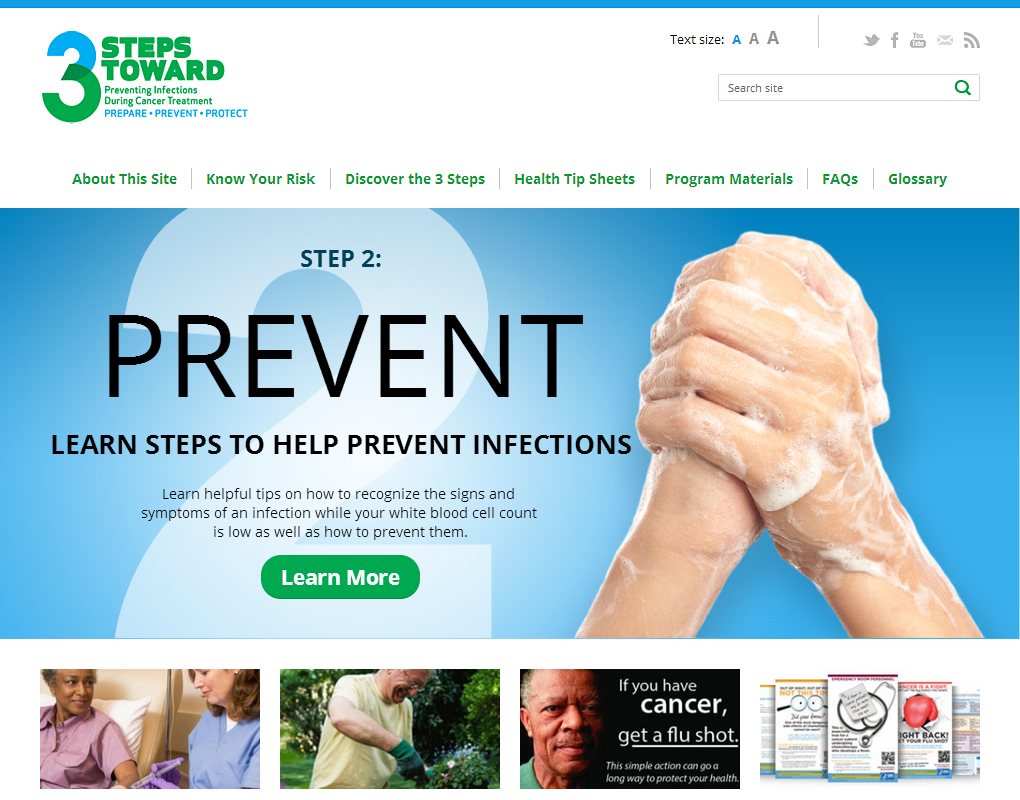You are here
Helping Cancer Patients Prevent Infections this Winter
A Q&A with CDC Medical Officer Alice Guh, M.D., M.P.H.
 The flu can hit anyone hard. But for those undergoing chemotherapy treatment, it can be life threatening. Cancer is a fight. Don’t let the flu knock you down. Learn how you can take action to protect yourself against the flu, so you can focus on the fight that matters most.
The flu can hit anyone hard. But for those undergoing chemotherapy treatment, it can be life threatening. Cancer is a fight. Don’t let the flu knock you down. Learn how you can take action to protect yourself against the flu, so you can focus on the fight that matters most.
The Centers for Disease Control and Prevention (CDC) is leading a comprehensive program focused on providing information, action steps and tools for patients, their families and healthcare providers to reduce the risk of developing potentially life-threatening infections during chemotherapy treatment.
Through this initiative, Alice Guh, M.D., M.P.H., CDC medical officer, shares tips on how cancer patients can help better protect themselves during flu season. We asked her a few questions:
Why are cancer patients at greater risk for infection from the flu?
Cancer patients who are receiving chemotherapy are vulnerable to infections when their white blood cell count is low. It’s important for cancer patients to understand how to prevent infections year-round, and especially during flu season. In the winter months, cancer patients face an additional infection risk: influenza or flu. Like other infections, flu is more likely to cause serious complications in cancer patients because of their weakened immune systems. These complications can include pneumonia, a disruption to their chemotherapy schedules, hospitalization and death.
How can cancer patients stay healthy as the winter weather continues?
Cancer patients can:
- Wash your hands, and encourage everyone you come into contact with to wash their hands as well.
- Get the flu shot (not the nasal spray vaccine). It is your best protection against the flu. It’s not too late to get the flu shot.
- Make sure the people you live with or who care for you get the flu shot.
- Avoid being around people who are sick.
What precautions can cancer patients take, especially during the cold months?
Cancer patients can:
- Treat a fever as an emergency and call your doctor right away if you develop a fever (>100.4).
- Take medication as prescribed.
- Talk to your healthcare provider for other precautions based upon your particular situation (type of cancer and treatment).
What are four things every cancer patient should know?
Every cancer patient should know:
- Fever in a cancer patient receiving chemotherapy is an EMERGENCY…call your doctor immediately.
- Get a flu shot.
- Wash your hands.
- Strong chemotherapy can weaken the immune system, making it harder for cancer patients to fight infections, including flu.
 Learn More about the Preventing Infections in Cancer Patients Program
Learn More about the Preventing Infections in Cancer Patients Program
The Preventing Infections in Cancer Patients program uses practical guidance and resources for patients, caregivers and healthcare providers about steps they can take to prevent infections. The program also provides tools and resources for clinicians. These resources can be downloaded, viewed, copied and distributed without alteration. A few of these resources include:
- A Basic Infection Control and Prevention Plan for Outpatient Oncology Settings. This plan includes key policies and procedures that will ensure a facility meets or exceeds minimal expectations of patient safety. (Pub #22-1028)
- Poster stressing the importance of cancer patients getting a flu shot: Cancer is a fight. Don’t let the flu knock you down. (Pub #22-1463)
- Postcard stressing the importance of cancer patients getting a flu shot: Cancer is a fight. Don’t let the flu knock you down. (Pub #22-1462)
Order copies of these materials
(Preventing Infections in Cancer patients under program tab)
Dr. Guh is sharing more information in media outlets throughout the country today.
Preventing Infections in Cancer Patients content was developed by CDC in collaboration with experts in the fields of oncology and infection control. Amgen provided its oncology expertise to the CDC Foundation which the CDC considered in the development of these important resources. This program was made possible through a CDC Foundation partnership with, and funding from, Amgen.